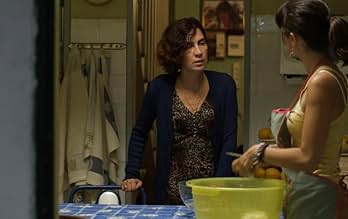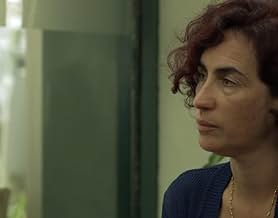CALIFICACIÓN DE IMDb
7.3/10
2.1 k
TU CALIFICACIÓN
Agrega una trama en tu idiomaA regular family living in the outskirts of Lisbon sees the serenity of their lives shaken beyond any remedy within a week.A regular family living in the outskirts of Lisbon sees the serenity of their lives shaken beyond any remedy within a week.A regular family living in the outskirts of Lisbon sees the serenity of their lives shaken beyond any remedy within a week.
- Dirección
- Guionista
- Elenco
- Premios
- 21 premios ganados y 9 nominaciones en total
Maria João Vaz
- Algarvio
- (as João Vaz)
- Dirección
- Guionista
- Todo el elenco y el equipo
- Producción, taquilla y más en IMDbPro
Opiniones destacadas
10vitor_04
This is a movie that i'll never forget. Rita Blanco is in the best (and when i say the best i mean the best) performance i've ever seen in cinema. Yes, i know - i'm Portuguese, it's predictable i would say this is a great movie. But the truth is that Joao Canijo sees the cinema exactly how i see it, going deep on characters and going deep on their misery, always with a peace of comedy and truth in it. it's not a complicated history, the sexual content in it it's not unnecessary and the music background was not written by big contemporany compositors. The only concern of Joao was to make a movie faithful to the inconditional love story behind a poor family with huge problems appearing.
There are no special effects, over-the-top car chases and its not in 3D. What lies at the center of this story is humanity and their daily joys and sufferings.
"Sangue do meu Sangue" is set in the sprawling barrios in the outskirts of Lisbon where everyday is a struggle for survival. The spotlight is placed on the Fialho clan. Marcia Fialho, the family matriarch has single handedly raised her two children: Claudia, a young woman with a promising future as a nurse engaged to Cesar and Joca who engages in nefarious activities to earn some cash. The family lives in a cramped apartment together with Ivete, Marcia's sister whose self-consiousnes adds to the drama in the story. Claudia is having an affair with her university professor, and Marcia vehemently opposes it. While Marcia focuses all her attentions on her daughter, her son is left unattended, though he has developed a close, almost incestuous relationship with her aunt Ivete. But their lives are about to become unstable through a series of events that will leave all of them shattered beyond repair.
Its very rare to find a movie where the characters aren't merely caricatures that have absolutely no motives for their actions and lack of passion. The characters formed by João Canijo, the director, are very complex and admirable. Marcia stands out as a model of female heroism as she will go to any length to defend her family, protect them and ensure their daily upbringing. Their emotionally unstable nature can also be seen through their hopes and actions.
The camera work and use of non-verbal communication is simply excellent, the mark of true film making and positioning of camera angles in order to communicate images that tell the story. All the characters carry their secrets, and in a setting where living space is cramped, the hushed whispers at strategic corners of the small apartment show that secrets cannot be easily hidden. For instance, Marcia and Claudia are forced to share a bed and conversations cannot be carried on in secret as characters will be passing by at one point or another.
Some of the pot twists that occur here are somewhat predictable, but they are done in such a way that you feel you are watching them for the first time.
This film is indeed a must watch, especially for those who appreciate film as a true work of art and entertainment.
"Sangue do meu Sangue" is set in the sprawling barrios in the outskirts of Lisbon where everyday is a struggle for survival. The spotlight is placed on the Fialho clan. Marcia Fialho, the family matriarch has single handedly raised her two children: Claudia, a young woman with a promising future as a nurse engaged to Cesar and Joca who engages in nefarious activities to earn some cash. The family lives in a cramped apartment together with Ivete, Marcia's sister whose self-consiousnes adds to the drama in the story. Claudia is having an affair with her university professor, and Marcia vehemently opposes it. While Marcia focuses all her attentions on her daughter, her son is left unattended, though he has developed a close, almost incestuous relationship with her aunt Ivete. But their lives are about to become unstable through a series of events that will leave all of them shattered beyond repair.
Its very rare to find a movie where the characters aren't merely caricatures that have absolutely no motives for their actions and lack of passion. The characters formed by João Canijo, the director, are very complex and admirable. Marcia stands out as a model of female heroism as she will go to any length to defend her family, protect them and ensure their daily upbringing. Their emotionally unstable nature can also be seen through their hopes and actions.
The camera work and use of non-verbal communication is simply excellent, the mark of true film making and positioning of camera angles in order to communicate images that tell the story. All the characters carry their secrets, and in a setting where living space is cramped, the hushed whispers at strategic corners of the small apartment show that secrets cannot be easily hidden. For instance, Marcia and Claudia are forced to share a bed and conversations cannot be carried on in secret as characters will be passing by at one point or another.
Some of the pot twists that occur here are somewhat predictable, but they are done in such a way that you feel you are watching them for the first time.
This film is indeed a must watch, especially for those who appreciate film as a true work of art and entertainment.
This movie made a strong impact by exposing the scars of a society living on the margins. It humanizes and dignifies the suffering of the working class, refusing any glamourization or easy redemption. Canijo presents characters who live on the edge, doing so with fierce empathy, leaving the audience with the feeling of having lived, if only for a few hours, within that dark and intense universe. This film is, ultimately, a reflection on family love and the cost of survival in adverse conditions, where every choice is a double-edged sword. It is a work that leaves its mark, highlighting João Canijo's power to explore the human condition in its most complex and often uncomfortable dimensions.
This sprawling drama about a Portuguese family combines melodrama and social realism so inventively that it practically occupies a genre of its own. Writer-director Joao Canijo grounds the movie in vivid observations of the Lisbon public housing complex where much of the action occurs, and his characterizations—developed, Mike Leigh-style, in close collaboration with the cast--have a similarly gritty authenticity. Yet the movie is also richly stylized, with old- fashioned tracking shots and compositions that allow for two conversations at once, and some narrative developments have the force of Greek tragedy. What emerges is an operatic portrayal of the working poor in which each character's struggle seems monumental. Rita Blanco and Rafael Morais are on top of their game with such deep and complex acting that makes us shiver. One of the best movies I've seen, ever! And definitely the best of 2011.
Joᾶo Canijo is indisputably one of the most interesting contemporary Portuguese movie directors. The four films seen to date, have left an indelible impression on me: Ganhar a Vida, Sapatos Pretos, Noite Escuro and recently Sangue do meu Sangue. His films send a punch to the viewers' guts leaving them breathless, knocked out; they abandon the moviehouse dazed by scenes that will haunt them for days to come.
Sangue do meu Sangue is set in the low working-class Bairro do Padre Cruz, a slum northeast of Lisbon, target to recent architectural projects and municipal efforts to efface its notoriously shady reputation. The film depicts a crosscut of three social classes: firstly the low working class Márcia and her family belong to; secondly the even less privileged Lisbon residents sharing with African immigrants a labyrinthine sub-world reminiscent of what Pedro Costa's trilogy on Fontainhas portrays. Finally the upper middle class represented by the Doctor and his wife living a Portuguese version of the "American dream": active professionals with a daughter who reside in an up-market dream home, two cars in the driveway and a servant at madam's beck and call.
Like Canijo's other films, Sangue to meu Sangue evolves around a central feminine character, Márcia, a single mother who has brought up and supported two children and a live-in sister. The women in Canijo's films are true heroines, resilient but nonetheless victims of their male chauvinistic environment; they inevitably fall prey to the violence perpetrated by men around them, be those pivotal male figures in their lives or simply placed in their paths by destiny. Indeed destiny plays an important role in the scripts Canijo writes. In Sangue do meu Sangue destiny has Cláudia falling in love with a married man linked in some way to her mother's past ─ I'll say no more, not wanting to include a spoiler. Destiny too has a devastating humiliation in store for Ivete, Márcia's sister, at the hands of a ruthless man she doesn't recognize at a karaoke; he remembers her from their schooldays when he had a crush on her. Likewise Márcia attempts to shake off her daughter's destiny, endeavouring at all costs to stop her daughter's love affair with a married man. Claúdia is gullible enough to believe an older married man will jeopardize the cushiness of his marital life, casting off wife and child in exchange for her. Márcia is above all most preoccupied with thwarting the oepidal twist in Canijo's script evoking Greek tragedy. In Greek tragedy no-one can escape what the gods have ordained for them. Canijo plays with the spectator, builds our hopes up that his characters trapped in their precariously balanced lives may just pull through, but just when Joca appears in a deus ex machina ploy to defend his aunt Ivete, we realize that his destiny was to end up behind bars as an adult for a crime graver than what had previously sent him to a reformatory as a minor.
Modern tragedy allows for pathos in ordinary men whose quotidian lives we identify with. The moving relationship between Ivete and her nephew Joca rings of incest. Márcia is busy salvaging her daughter's future whereas Ivete takes upon herself the mission of safeguarding her nephew whose life is jeopardized by an unpaid debt. An unforgettable scene is Ivete and Jaco making their way through the narrow, unsightly, claustrophobic streets of the slum to the house of the drug dealer to settle Joca's debt. We sense imminent danger and the foreboding uneasiness of walking into a maze with no exit, a throwback to the Minotaur of Greek mythology awaiting his victims about to enter his domain. This family's financial constraints oblige them to share a reduced space. Canijo plays and uses this limitation to his advantage; he places the characters in a trap. Márcia, the siblings Cláudia and Joca and her sister Ivete are forced to stretch their capacity for cohabitation to the limit. So reduced a space leaves no room for secrets, the characters learn to lower their voices to maintain a privacy of sorts ─ even when what would really suit them would be to seek relief in shouting out their woes at the top of their voices ─ secrecy is too rare a luxury in a house where mother and daughter share a a tiny bedroom and bed, four people share a tiny bathroom sometimes peeing with the door open, and watching TV means sitting cramped on the settee legs stretched out over the other occupant's lap. Conversation is interrupted by someone crossing the room to get something, by someone coming out of the bathroom, by the normal comings and goings that the house by its nature and especially size imposes on the life of its occupants. Canijo at times divides the screen into two keeping discrete but parallel conversations going simultaneously; not unlike when in an opera a quartet sings, each couple busy with their own theme. This requires the spectators'maximum attention opting for the conversation which contributes more to unfolding of the melodrama.
Above all Canijo's great sense of tempo never lets a scene drag (a common trait to Portuguese cinema). His has an uncanny ability to build crescendo. We become entranced despite the ominous certainty that the ending is bound to be harrowing.
Rita Blanco, Anabela Moreira and Teresa Tavares render magnificent performances. Due praise to Anabela Moreira for what must have been an awfully difficult shooting experience of total frontal and back nudity picked up by the camera with the crudity Canijo's hyper-realism requires. Nothing like it since Isabela Rosselini in Blue Velvet. Mesmerizing and moving is the dignity Moreira imbues her character with, an air of "you can do what you like with my body but you'll never have my soul". The love she professes for her nephew, blood of her blood, which is what the film's title means, elevates her above the sordidness her sacrifice plunges her into.
Sangue do meu Sangue is set in the low working-class Bairro do Padre Cruz, a slum northeast of Lisbon, target to recent architectural projects and municipal efforts to efface its notoriously shady reputation. The film depicts a crosscut of three social classes: firstly the low working class Márcia and her family belong to; secondly the even less privileged Lisbon residents sharing with African immigrants a labyrinthine sub-world reminiscent of what Pedro Costa's trilogy on Fontainhas portrays. Finally the upper middle class represented by the Doctor and his wife living a Portuguese version of the "American dream": active professionals with a daughter who reside in an up-market dream home, two cars in the driveway and a servant at madam's beck and call.
Like Canijo's other films, Sangue to meu Sangue evolves around a central feminine character, Márcia, a single mother who has brought up and supported two children and a live-in sister. The women in Canijo's films are true heroines, resilient but nonetheless victims of their male chauvinistic environment; they inevitably fall prey to the violence perpetrated by men around them, be those pivotal male figures in their lives or simply placed in their paths by destiny. Indeed destiny plays an important role in the scripts Canijo writes. In Sangue do meu Sangue destiny has Cláudia falling in love with a married man linked in some way to her mother's past ─ I'll say no more, not wanting to include a spoiler. Destiny too has a devastating humiliation in store for Ivete, Márcia's sister, at the hands of a ruthless man she doesn't recognize at a karaoke; he remembers her from their schooldays when he had a crush on her. Likewise Márcia attempts to shake off her daughter's destiny, endeavouring at all costs to stop her daughter's love affair with a married man. Claúdia is gullible enough to believe an older married man will jeopardize the cushiness of his marital life, casting off wife and child in exchange for her. Márcia is above all most preoccupied with thwarting the oepidal twist in Canijo's script evoking Greek tragedy. In Greek tragedy no-one can escape what the gods have ordained for them. Canijo plays with the spectator, builds our hopes up that his characters trapped in their precariously balanced lives may just pull through, but just when Joca appears in a deus ex machina ploy to defend his aunt Ivete, we realize that his destiny was to end up behind bars as an adult for a crime graver than what had previously sent him to a reformatory as a minor.
Modern tragedy allows for pathos in ordinary men whose quotidian lives we identify with. The moving relationship between Ivete and her nephew Joca rings of incest. Márcia is busy salvaging her daughter's future whereas Ivete takes upon herself the mission of safeguarding her nephew whose life is jeopardized by an unpaid debt. An unforgettable scene is Ivete and Jaco making their way through the narrow, unsightly, claustrophobic streets of the slum to the house of the drug dealer to settle Joca's debt. We sense imminent danger and the foreboding uneasiness of walking into a maze with no exit, a throwback to the Minotaur of Greek mythology awaiting his victims about to enter his domain. This family's financial constraints oblige them to share a reduced space. Canijo plays and uses this limitation to his advantage; he places the characters in a trap. Márcia, the siblings Cláudia and Joca and her sister Ivete are forced to stretch their capacity for cohabitation to the limit. So reduced a space leaves no room for secrets, the characters learn to lower their voices to maintain a privacy of sorts ─ even when what would really suit them would be to seek relief in shouting out their woes at the top of their voices ─ secrecy is too rare a luxury in a house where mother and daughter share a a tiny bedroom and bed, four people share a tiny bathroom sometimes peeing with the door open, and watching TV means sitting cramped on the settee legs stretched out over the other occupant's lap. Conversation is interrupted by someone crossing the room to get something, by someone coming out of the bathroom, by the normal comings and goings that the house by its nature and especially size imposes on the life of its occupants. Canijo at times divides the screen into two keeping discrete but parallel conversations going simultaneously; not unlike when in an opera a quartet sings, each couple busy with their own theme. This requires the spectators'maximum attention opting for the conversation which contributes more to unfolding of the melodrama.
Above all Canijo's great sense of tempo never lets a scene drag (a common trait to Portuguese cinema). His has an uncanny ability to build crescendo. We become entranced despite the ominous certainty that the ending is bound to be harrowing.
Rita Blanco, Anabela Moreira and Teresa Tavares render magnificent performances. Due praise to Anabela Moreira for what must have been an awfully difficult shooting experience of total frontal and back nudity picked up by the camera with the crudity Canijo's hyper-realism requires. Nothing like it since Isabela Rosselini in Blue Velvet. Mesmerizing and moving is the dignity Moreira imbues her character with, an air of "you can do what you like with my body but you'll never have my soul". The love she professes for her nephew, blood of her blood, which is what the film's title means, elevates her above the sordidness her sacrifice plunges her into.
¿Sabías que…?
- TriviaPortugal's official submission to the Best Foreign Language Film category of the 85th Academy Awards 2013.
Selecciones populares
Inicia sesión para calificar y agrega a la lista de videos para obtener recomendaciones personalizadas
- How long is Blood of My Blood?Con tecnología de Alexa
Detalles
- Tiempo de ejecución2 horas 11 minutos
- Color
- Mezcla de sonido
- Relación de aspecto
- 1.85 : 1
Contribuir a esta página
Sugiere una edición o agrega el contenido que falta

Principales brechas de datos
By what name was Sangue do Meu Sangue (2011) officially released in Canada in English?
Responda






























